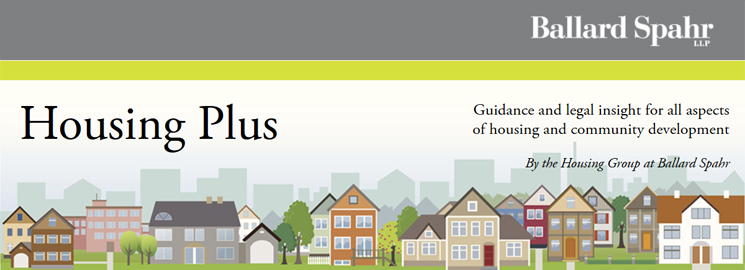
On February 3, 2016, HUD published a notice in the Federal Register to announce that “it is considering rulemaking to ensure that individuals and families residing in HUD public housing in fact continue to need housing assistance from HUD after admission.”
HUD cites the July 2015 report by its Office of the Inspector General, which found that approximately 25,000 families living in public housing (or less than 3% of all families living in public housing) exceed HUD’s low-income limit, as the impetus for its consideration of rulemaking on this topic.
HUD seeks comments from the public about structuring policies to reduce the number of individuals and families in public housing whose incomes significantly exceed the income limit and have significantly exceeded the income limit for a sustained period of time after initial admission. Comments are due Friday, March 4th.
In particular, HUD solicits comments on the following issues:
1. How should HUD define income that “significantly” exceeds the income limit for public housing residency? Should such higher amount be determined by dollar amount, by a percentage, or as a function of the current income limit, and what should the amount be?
2. Should area cost of living and family finances be taken into consideration when determining whether an individual or family no longer needs public housing assistance? Are there limits to the circumstances in which said data should be requested and applied in a determination?
3. What period of time in which an individual or family has had income that significantly exceeds the income limits should be determined as indicative that the individual or family no longer needs public housing assistance?
4. How should local housing market conditions or housing authority wait list data be considered?
5. What period of time should be allowed for an individual or family to find alternative housing?
6. Are there exceptions to eviction or termination of tenancy that HUD should consider beyond those listed in HUD’s regulation in 24 CFR 960.261?
7. Should HUD allow over-income individuals or families to remain in public housing, while paying unsubsidized or fair market, rent? How would such a provision impact PHA operations and finances?
8. Should HUD require a local appeals process for individuals or families deemed over-income?
9. Where over-income policies have been implemented, what were the results to public housing residents and PHAs? What were the specific positive and negative impacts?
10. What financial impact would over-income policies have on PHA operations, and how can any negative impacts be mitigated?
11. What are the potential costs and benefits to public housing residents and PHAs that could result from the forcible eviction of public housing tenants?
12. What evidence currently exists in favor of or against the adoption of this type of policy?
Comments can be submitted electronically at http://www.regulations.gov/ or to the following address:
Regulations Division
Office of General Counsel
U.S. Department of Housing and Urban Development
451 7th Street SW., Room 10276
Washington, DC 20410–0500